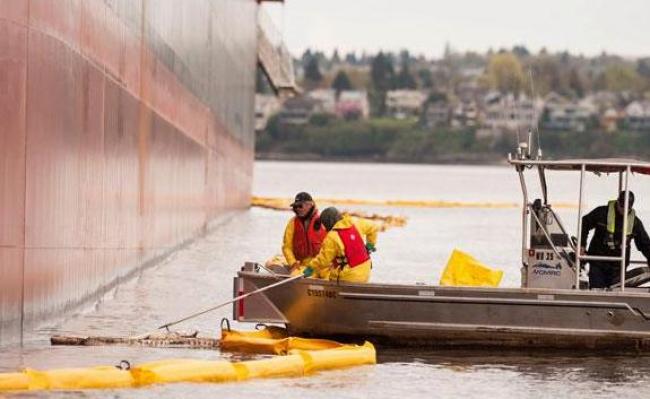Articles Menu

May 24, 2018
After all this reading and writing, we’ve had three heart-sinking realizations.
This is a shocking number, and it’s not talked about very much. Industry will talk about how quickly they deploy, but not about how well they contain and recover spilled oil. They will talk about the limitations of resources, technology and weather. Now, it’s true the technology is limited, and hasn’t changed much since the Exxon Valdez, and that we need more equipment, more ships and more labour dedicated to spill response. But on our coast, the response organization is owned by the fossil fuel industry. If they want more resources or more r+d into new technologies, they can invest. They could raise the bar above 15%, or they could refuse to move their product in the kind of weather that hampers clean up efforts. They never will, of course, because there is a lot of money to be made moving fossil fuels the way we traditionally have. Industry has a lot of financial incentive to keep things cheap, and governments are always mindful of resource revenues (even when that revenue, as in the case of the oil and gas industry, is rapidly declining).
Our submission is strongly focused on meaningful community oversight of oil transits. We put forward that BC should adopt the model that has worked for Alaska, Regional Citizens’ Advisory Councils (RCACs), as a starting place to consider what community oversight in BC would look like. RCACs are recognized around the world as a best practice, to the degree that US Democrats and Republicans in Florida, not traditionally groups that are in alignment, both think they should be part of oil spill planning in the Gulf of Mexico. So why haven’t they spread further? The answer is, at least partially, because their very existence holds the fossil fuel shippers to a higher, and therefore more expensive, standard. Fossil fuel companies spend a lot of money lobbying governments to make sure that shipping their product doesn’t get more expensive. The Alaskan RCACs were established in the wake of the Exxon Valdez disaster, when public trust in oil spill response was practically non-existent. Short of that kind of disaster, the political will to make moving fossil fuels more expensive is hard to find.
Regulatory capture is defined as “the result or process by which regulation, in law or application, is consistently or repeatedly directed away from the public interest and toward the interests of the regulated industry, by the intent or action of the industry itself”. And it is unfortunately commonplace in Canadian environmental governance. In terms of the oil and gas industry, this is definitely not limited to oil spill response. We’ve seen BC’s climate targets re-written in closed-door meetings with oil and gas companies, pipeline proposal assessments tainted by secret meetings with industry insiders, regulatory reports on pipeline breaches altered after the company was given drafts. In Alberta, the regulator reports that median clean up of pipeline spills is 100%, as compared to 3.4% in North Dakota. Regulatory capture is so pervasive that the former leader of Alberta’s Official Opposition says the oil industry has created a “deep state” in Canada. Governments are besieged by fossil fuel industry lobbyists, and the relatively low standard of regulations for oil spills are one result.
Georgia Strait Alliance is gearing up to be one of the only NGOs to take part in the technical working groups that the Province of BC is putting together to look at new oil spill regulations, with three of our staff participating. It is, not surprisingly, a very industry-heavy process which is why our participation so important. We’re going to advocate strongly for community oversight, for a process that is paid for by the industry but not controlled by them. We think independent science and analysis should be driving the oil spill regime, that we have transparent, comprehensive and compulsory rules for fossil fuel shippers. We think that shippers should demonstrate they can clean up spilled product, and if they can’t, that they are limited to moving it at times and in places they can.
We’ll be doing our part to make your voice heard – and posting details and information on social media about next steps. Like and follow our Facebook page, follow us on Twitter, and Instagram.
We are working hard to be a voice for the community amongst industry, representing those who love the strait. There will be an end to technical working groups and a follow-up opportunity for public engagement, and we will need you. You can be a part of the work now by amplifying the information we post, by talking to your neighbours, and by keeping in touch.